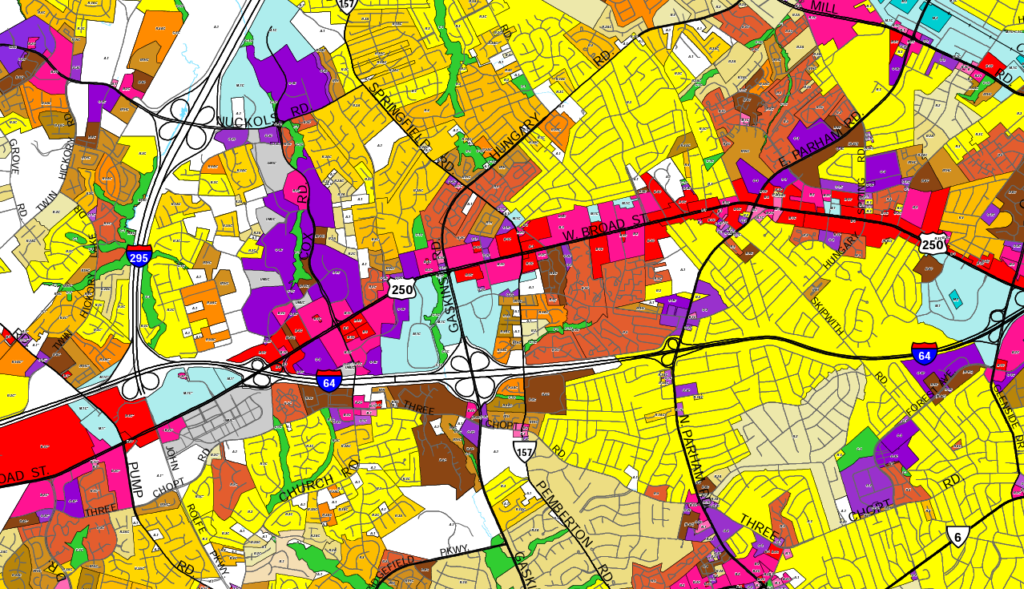The FWD #209 • 916 Words
Housing advocates continue their advance, but new challenges are slowing their progress on some fronts
Across the U.S., zoning reform continues to be at the forefront of discussions around housing affordability issues. We’ve been keeping tabs on major zoning news in other states, as well as right here in Virginia. Here are a few things we’re keeping a close eye on.
Earlier this year, Colorado’s state legislature passed several bills focused on local land use policy. These new laws are attempts to reorient zoning to support residential density and transit-oriented development.
- House Bill 1313 will require 31 local governments to change their zoning along major bus and rail corridors. The bill specifically requires those local governments to allow for at least 40 residential units per acre within a quarter mile of bus stops and a half mile of rail stations. Along with this bill, there is approximately $35 million in financial incentives that can be used to support affordable housing projects.
- House Bill 1152 will allow for accessory dwelling units by right in localities that are within a metropolitan planning organization’s footprint. In addition, the bill also creates a state-administered grant and loan program to help finance the construction of ADUs built by low- and moderate-income homeowners.
- House Bill 1304 will eliminate parking minimums for multifamily, mixed use with residential, and residential adaptive reuse developments. The bill limits the elimination of parking minimums to cities and towns within metropolitan planning organizations.
- House Bill 1007 will prevent local governments from restricting how many unrelated people can live together. While focused on college towns, the bill has sought to allow greater flexibility in living arrangements to address housing affordability.
A bit further west, a noteworthy proposal in the Utah state legislature ultimately failed, but possibly serves as a useful preview to similar efforts in other states. What made House Bill 306 interesting was its explicit reference to “starter homes.” The bill would have overridden local zoning codes in “urban municipalities” by permitting starter homes as a by-right use in residential zones. In the bill, lawmakers defined starter homes as:
“A detached, single-family residential unit that… the unit’s builder sells to the first homeowner of the unit at a price that is less than the median price for detached, single-family residential units within the municipality in which the unit is located; and… is subject to a deed restriction requiring the unit to be owner-occupied for the first five years following the issuances of a certificate of occupancy.”
The bill went even further by preventing urban municipalities from denying approval of residential lots that are at least 5,400 square feet in size. It also would have prohibited any impact fees on starter homes not related to roads, sewer, or fire protection services.
Understanding potential pushback from his conservative colleagues, the bill’s sponsor Republican Raymond Ward acknowledged how housing is not just a local issue, but also a “statewide problem.”
Charlottesville, like Arlington and Alexandria, now faces a legal challenge to its recently passed zoning reform efforts. The suit brought by nine residents alleges the City failed to follow a requirement of the comprehensive planning process as set out by the Code of Virginia, by sending only the transportation chapter to the Virginia Department of Transportation, and not the entire plan. For this reason, they claim that the adopted comprehensive plan and the ensuing zoning ordinance update are both void.
The City now seeks to have the case dismissed. Speaking for himself and not formally for the City, Councilman Michael Payne told Charlottesville Tomorrow:
“The process of rewriting the City’s zoning code occurred over a period of 7 years, with extensive community engagement… City Council and staff carefully reviewed all elements of the new zoning throughout that process. As we’ve seen in Arlington and localities across the country, zoning changes are often followed by litigation. I feel confident that we’ve done our due diligence and followed the law and proper procedure for all elements of the new zoning code.”
Meanwhile, a similar story is playing out in Star City. In a 5-2 vote, Roanoke City Council enabled more diverse types of housing to be built in zoning districts formerly reserved only for single-family detached homes. And like clockwork, a small group of dissatisfied residents took legal action.
Once again citing an administrative error, the lawsuit claims the public notice advertising the council meeting to vote on the zoning ordinance amendment was “unreasonable and ineffective.” However, the amendments directly followed a two-year comprehensive plan update, and outreach on these specific zoning changes started last fall.
Across the Potomac, Montgomery County, Maryland—renowned for pioneering inclusionary zoning in the 1970s—is once again putting zoning at the center of its housing affordability strategy. This time around, they’re aiming to increase the diversity of housing options, unravel exclusionary single-family zoning, and create more opportunities for homeownership by allowing for smaller detached and attached homes.
According to County Council President Andrew Friedson, “If we don’t have enough housing, it has devastating impacts on every aspect of our life—economically, environmentally, from an equity standpoint. […] We have to address that through zoning.”
See you in Arlington next week!
Next Thursday, we’ll launch the Northern Virginia Zoning Atlas with the Mercatus Center at George Mason University at the 2024 Leckey Forum, hosted by the unified Northern Virginia Affordable Housing Alliance (NVAHA) and the Alliance for Housing Solutions (AHS). Join us as we bring the conversation across the Potomac and analyze how zoning is impacting housing in Northern Virginia.
